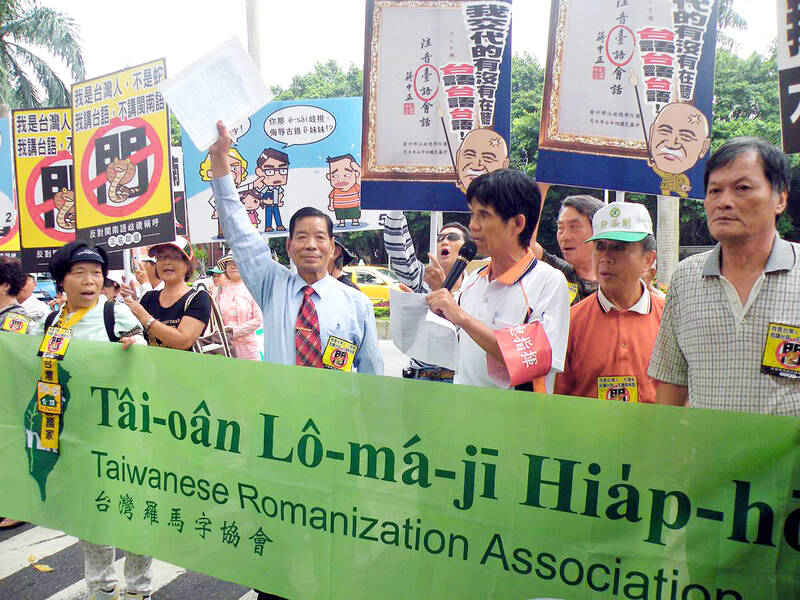Pro-Taiwan localization advocates on Wednesday launched a signature petition to assert their language rights and the right to use the name “Taiyu” (台語) to officially describe the language of the majority of people in Taiwan, in a protest against Chinese Nationalist Party (KMT) lawmakers who are seeking to revert to the language’s former name, Minnanyu.
The petition aims to gather support for the Ministry of Education, which in July announced that starting with language proficiency examination, it would change the language’s formal name to “Taiyu” from “Minnanyu” (Hokkien or Southern Min, 閩南), and would intend to use the new term in official notices and government documents.
At a hearing at the legislature’s Internal Administration Committee on Wednesday, KMT Legislator Hsu Hsin-ying (徐欣瑩) opposed the term “Taiyu,” alleging that its use would infringe on the rights and status of other languages spoken in Taiwan while also questioning the suitability of the term “Taiyu” under the official legal definition as being among Taiwan’s “national languages.”

Photo courtesy of the National Cheng Kung University’s Taiyu Research Office
Hsu, an ethnic Hakka, requested reports from government ministries and questioned officials on reasons for the change to “Taiyu,” which Hsu claimed would elevate its status and threaten the use of Hakka and the languages of Taiwan’s indigenous peoples.
Deputy Minister of Culture Lee Ching-hwi (李靜慧) said that “Taiyu is a special term and is not intended to refer to all other languages in Taiwan.”
“Taiyu is one of our national languages, and its status is equal to Hakka, all languages of Taiwan’s indigenous peoples, the Mindong language of Matsu Island and Taiwan Sign Language,” Lee said.
“The new term for Taiyu would not infringe on all these other languages recognized as our national languages... Taiyu, as well as Hakka, and indigenous languages are facing a crisis of dying out, and need government resources to protect and preserve them and pass them on to the younger generation,” Lee said.
Taiwan localization groups and language rights activists condemned Hsu for organizing the hearing, calling it an attempt by the KMT to pressure government ministries, stop the “Taiyu” language rights movement and turn back the clock to using the term “Minnanyu,” as its way of “continuing to denigrate Taiwanese.”
In a statement, Taiyu language advocates accused Hsu of upholding the past policy of “Mandarin Chinese” supremacy, while also protecting the Hakka ethnicity, and deliberately forcing the assimilation and marginalization of Taiyu and Taiwan’s indigenous peoples’ Austronesian languages.
Chiung Wi-vun (蔣為文), professor of Taiwanese literature at National Cheng Kung University, said Taiyu is a specific term and does not extend to other languages.
Chiung accused Hsu of having the mindset of a “Hakka chauvinist” by claiming that Taiyu would erase Hakka and Taiwan’s indigenous languages.
Chiung and other advocates said that the government had approved the Development of National Languages Act (國家語言發展法) in 2019 to certify that all “natural languages” used by ethnic groups in Taiwan are national languages.
They added that Article 33 of the Universal Declaration of Linguistic Rights passed in 1996 states that “all language communities have the right to refer to themselves by the name used in their own language.”

Taiwanese can file complaints with the Tourism Administration to report travel agencies if their activities caused termination of a person’s citizenship, Mainland Affairs Council Minister Chiu Chui-cheng (邱垂正) said yesterday, after a podcaster highlighted a case in which a person’s citizenship was canceled for receiving a single-use Chinese passport to enter Russia. The council is aware of incidents in which people who signed up through Chinese travel agencies for tours of Russia were told they could obtain Russian visas and fast-track border clearance, Chiu told reporters on the sidelines of an event in Taipei. However, the travel agencies actually applied

Japanese footwear brand Onitsuka Tiger today issued a public apology and said it has suspended an employee amid allegations that the staff member discriminated against a Vietnamese customer at its Taipei 101 store. Posting on the social media platform Threads yesterday, a user said that an employee at the store said that “those shoes are very expensive” when her friend, who is a migrant worker from Vietnam, asked for assistance. The employee then ignored her until she asked again, to which she replied: "We don't have a size 37." The post had amassed nearly 26,000 likes and 916 comments as of this

New measures aimed at making Taiwan more attractive to foreign professionals came into effect this month, the National Development Council said yesterday. Among the changes, international students at Taiwanese universities would be able to work in Taiwan without a work permit in the two years after they graduate, explainer materials provided by the council said. In addition, foreign nationals who graduated from one of the world’s top 200 universities within the past five years can also apply for a two-year open work permit. Previously, those graduates would have needed to apply for a work permit using point-based criteria or have a Taiwanese company

The Shilin District Prosecutors’ Office yesterday indicted two Taiwanese and issued a wanted notice for Pete Liu (劉作虎), founder of Shenzhen-based smartphone manufacturer OnePlus Technology Co (萬普拉斯科技), for allegedly contravening the Act Governing Relations Between the People of the Taiwan Area and the Mainland Area (臺灣地區與大陸地區人民關係條例) by poaching 70 engineers in Taiwan. Liu allegedly traveled to Taiwan at the end of 2014 and met with a Taiwanese man surnamed Lin (林) to discuss establishing a mobile software research and development (R&D) team in Taiwan, prosecutors said. Without approval from the government, Lin, following Liu’s instructions, recruited more than 70 software